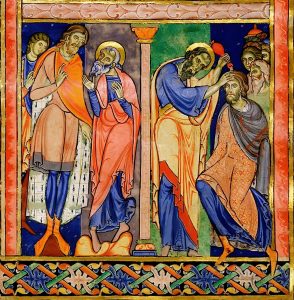
Here is an interesting observation from 1 Samuel 10 that I had to pass over during the sermon on Sunday morning due to time constraints: Saul was chosen to be king using lots.
The reason I find this passage interesting is it provides additional Biblical support for how Calvary selects elders and deacons. Acts 1 is the best passage for affirming the practice of casting lots to choose leaders, but here in 1 Samuel 10, Israel’s first king is chosen by lots.
Lots will also be used just a few chapters later in 1 Samuel 14 (part of our passage for this week) to highlight Jonathan as the person who ate food when everyone was commanded not to eat. This example gives further evidence to the common use of casting lots in Israel and the way that God speaks through them.
It is important to note that we do not have any examples of the casting of lots in the Bible where the lot falls to the wrong person. In the case of Saul in 1 Samuel 9-11, Saul had already been anointed as king by Samuel in a secret ceremony but only God, Saul and Samuel were privy to that information.
If Samuel anointed Saul, why did there need to be the casting of lots?
Because even though God had selected Saul, there needed to be a way to communicate that decision to the people, which would be recognized as being from the Lord as opposed to being the will of Samuel. So casting lots became the second step in the process. There is actually a third step in the process in 1 Samuel 11. After Saul is chosen by lots to become king, the Spirit comes upon Saul and he leads Israel to great victory. After the victory, the people acclaim Saul as king, affirming the decision made through the casting of lots, which itself was an affirmation of the secret anointing ceremony between Saul and Samuel.
If the casting of lots was used to select Saul as king, why wasn’t David selected in this way?
I believe David was selected using a different method because when David was chosen to be Israel’s future king, Saul was still the reigning king. And during the time between David’s anointing and his ascension to the throne there were many years for God to prove that David was his chosen king. As a result, the casting of lots was not necessary to affirm God’s choice of David.
Both Saul and David were anointed by God to be king. At the time of his ascension, Saul was known by very few people in Israel and time constraints mandated that he be selected immediately. At the time of David’s ascension, everyone in Israel knew who he was and could affirm God’s calling on his life to be king.
If you are interested in how lots are being used today in Egypt, check out this article on the selection of a leader for Coptic Christians on ChristianityToday.com.
Blessings,
Jim

